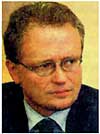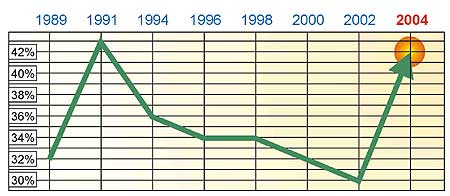
Stanislaw Latek
National Atomic Energy Agency
NUCLEAR NEWS FRO M POLAND
History
In spite of the fact that electricity production
in Poland was traditionally based on the huge Polish hard coal
mining, the Polish government in early seventies decided to introduce
nuclear power to domestic electricity balance. In 1972 the site
for the first nuclear power plant was selected, and by 1984 eight
different localities were examined for the next two nuclear power
stations.
In 1974 an agreement on co-operation in the
field of nuclear power was signed between Poland (at that time
the Polish People's Republic) and the Soviet Union. For the first
Polish nuclear power plant four VVER-440/213 units based almost
entirely on Soviet supplies were chosen, and cooperation of that
plant with already existing water-pumping station on Zarnowiec
Lake on the Baltic Sea, was predicted. The final Decision to start
construction of the first plant in Zarnowiec was taken by the
Council of Ministers in January 1982, and was followed by the
construction contract between Polish and Soviet governments signed
in April 1983; the construction works started in 1984.
In December 1981 a martial law was imposed in
Poland and the society was deprived of any possibility to express
its opinion. Furthermore, especially in those years, Soviet technology
was perceived as being technically not reliable, playing a role
of economical and political pressure on satellite states. I n
1986 the Chernobyl catastrophe not only confirmed that opinion,
but also resulted in a worldwide increase of a strong anti-nuclear
attitude. When in 1989 Poland regained her independence, the continuation
of construction of Zarnowiec power plant became an issue strongly
criticised from both economic and political points of view. The
new Polish government consulted on the subject some independent
nongovernmental groups as well as foreign organizations. On their
advice and facing vigorous anti-nuclear demonstrations, on 4 September
1990 the government, in spite of well advanced stage of the project
and money already spent, decided to interrupt construction of
the Zarnowiec NPP that is to phase out the nuclear energy programme
in Poland. Nevertheless, the Parliamentary Resolution of 9 November
1990, in which that decision was approved, stated at the same
time that nuclear energy had to be developed in Poland after 2005,
requiring that "future Polish nuclear power plants met the
European safety standards and operated reactors of the newest
generation"
Present situation
Poland, being a country with population of over
38,5 million and a medium scale economy, is consuming electrical
energy at the level of less than 3800 KWh per capita.
In the last two years Poland has experienced
a significant economic growth, the GDP increasing by about 3.8
percent in 2003 and 5.4 percent in 2004. According to recent analyses
in the forthcoming years the economic growth rate in Poland will
remain rather high (4- 5%). Continuation of economic prosperity
requires a substantial increase of electricity generation in the
next decades.
Coal is still a major energy source in Poland, including electricity
generation sector, but many coal burning power plants have been
operated for over 30 years, thus they soon will have to be modernized
or decommissioned.
Every five years a document on the national
energy strategy for the next twenty years is prepared, broadly
discussed and then approved by the Polish government. Those documents
take into account different scenarios for the national economy
growth in the period under consideration. All such analyses before
2000 incorporated among the electricity sources also nuclear power
plants. However, the last strategy paper of 2000 did not predict
a nuclear option for Poland before the year 2020.
Very recently the situation has changed In the
energy strategy document for the years 2005- 2025, which has been
approved on 4 January 2005 the Polish government has confirmed
its intention to have the country's first nuclear power plant
in operation by 2021 or 2022.
Long-term forecast
The document "Energy policy up to 2025",
which was accepted by Poland's Council of Ministers was based
on the long-term forecast for fuel and energy demand The forecast
for national energy demand by 2025 has been prepared in four following
variants (the demographic macroeconomic, ecological and methodological
conditions and assumptions were taken into account):
-
Treaty Variant, which takes into account
the provisions of the Accession Treaty concerning the energy
sector, i.e. achieving 7.5% index for electricity consumption
from renewable sources by 2010, achieving 5.75% index for
bio-fuels share in total gasoline and fuel oil sales by 2010,
and restricting the total emissions from large combustion
facilities to the values established in the Treaty;
-
Basic Coal Variant, differing from the Treaty
variant by the fact that the requirement concerning the restriction
of emissions from large combustion facilities is replaced
by the implementation of the National Emission Reduction Plan
(KPRE), which allows the postponement until 2020 of the deadline
for compliance with emission requirements established in the
Accession Treaty for 2012. In this variant the hard coal supply
restrictions are not assumed, and no presumption is made for
the domestic and imported coal shares;
-
Basic Gas Variant, differing from the Basic
Coal variant only by the fact that the hard coal supplies
for electricity generation will be kept on present level,
and the necessary additional quantities of electricity in
this variant will be generated basing primarily on
natural gas as the fuel;
-
Effectiveness Variant, which fulfils the same ecological
criteria as the Basic variants, but assumes achievement of
additional power industry effectiveness in the areas of electricity
generation, transmission and distribution, and also its consumption,
as a result of pro-active state policies.
In each variant the cost performance of the
domestic fuel and power industry sector has been optimized within
the assumed ecological restrictions.
In any of the variants the maximal net import
of electricity could not exceed 10TWh, i.e. the quantity corresponding
to the present net export level. In some cases also some serious
restrictions of social nature may appear.
In the period included in the forecast, the
demand for electric energy will increase with the average annual
rate close to 3 percent, with the increments in all variants relatively
smaller in the first 10-year period and relatively larger in the
second one.
Up to 2025 the national energy consumption is
expected to rise by 48-55 percent for the final energy, and by
80-93 percent for electric energy.
In all variants the introduction of nuclear
power program is foreseen after 2020; this is justified by the
need to diversify primary energy sources and the need to restrict
the greenhouse gases and sulfur dioxide emissions to the atmosphere.
Prognostic calculations indicate that the nuclear power program
should be started in the last five years of the period under consideration.
Commissioning of the first nuclear power plant
before 2020 is deemed to be impossible, as the estimated duration
of investment process in a country practically deprived of any
experience in this area is 10 years, plus 5 years for public campaign
preceding the investment, to secure the acceptance of nuclear
power program.
The document adds:" At the assumed GDP
volume increase and foreseen energy demand increase it has been
assumed that by 2025 year Poland would be much closer to the energy-consuming
standards attained in highly developed countries."
Comments, reactions and opinions
| 
|
Jacek Piechota
Secretary of State in the Ministry of Economy and Labour |
Mr Jacek Piechota - Minister
of Economy and Labour : “I would like to turn your attention
to the fact that the decisions concerning the investment will
be taken not by the government. For the investor to be willing
to invest in such project, appropriate economic, legal and regulatory
conditions have to be created. According to EU directive, market
directive, which is being introduced by the energy act debated
presently in the Parliament, only in the situation when we know
that in 10 years (approximate process's duration time up to the
commissioning of a new plant), i.e. by 2010, if no investor for
such project willing to realize it at his own risk will appear,
the government may use the only instrument allowed in the market
directive the incentive in the form of public assistance directed
at such investor. Thus circa 2010, if there would be no changes
in the technology, no changes in the development works, the future
government at that time will have to make a decision on this issue:
if no investor will turn up - than announce a competitive tender
on the EU territory, offering specific economic incentives for
investor willing to invest in the area of nuclear power industry.
We are talking of the power industry in 2020;
we are talking of the power plant, which would start to be operated
within the system then. In fact we have 5 years for public debate
on this issue, 5 years for deliberations. We Recognize that Poland
faces rigid environmental challenges. All forecast indicate that
such need will appear, thus we should start the discussion sooner
rather than later. We have 5 years to discuss this issue”.

|
Dr Zbigniew Karaczun
activist of Polish Ecological Club |
Mr Zbigniew Karaczun
–activist of Polish Ecological Club:”[This policy]
means the centralization of power industry and strengthening power
lobby. And all this in behalf of nuclear physicists trained for
Zarnowiec [nuclear power plant], who now are looking for job.
This project has been authored by people associated with power
industry.
I think that Western consortia are interested
in this. I mean, in selling the technology. I think that many
Western companies are lobbying for this. More and more Western
countries renounce nuclear power, so their market is closing down.
They look for other outlets. They may press obsolete technologies
upon us. Because our contribution to this project consists of
pouring out concrete for foundations. All the rest will be imported.
Nuclear energy programme in Poland is against national economy
interests.
Our greatest problem at present is creation of new jobs. And nuclear
power plant Construction means the export of jobs to foreign countries.
Technology that will be used would be a foreign one. Meanwhile
we have energy surplus; we have energy supply Security. We haven't
touched renewable energy. Wind, solar. Anyhow at present I see
no argument in favor of developing nuclear power industry.
|
Dr Tadeusz Wójcik
Honorary President of Polish Nuclear Society
|
Mr Tadeusz Wojcik – Honorary
member of Polish Nuclear Society (exception from interview):
Why do we need a nuclear power plant
again?
We would not need it if our goal were to pacify public mood. But
the diversification of energy sources is necessary. Like the restriction
of carbon dioxide and sulfur compounds emissions.
Do you think that our government's decision
will result in Green Party formation?
Such party may appear in our country.
As efficient as the one in Germany?
If Green Party members would prove that Poland will
remain secure with respect to energy supplies, especially these
of natural gas, and people would not pay more for electricity
then they probably will be successful. But in my opinion they
will not prove that. They didn't do that in 15 countries of the
old EU, where the nuclear power share in all electric energy generated
is close to 34 percent.
Can we afford nuclear power?
In market economy power plant construction is not financed by
the government. It is financed by energy utilities.
How much will it cost us?
Environmental activists, who stopped the construction of Zarnowiec
nuclear power plant, did not worry about losing $1.5 billion.
In this region of Europe ours is the only country to halt the
construction and stop the maintenance works on all which already
has been build.
So we really can't do without this plant?
If a technology free from harmful substance emissions were invented,
than people would not decide to choose nuclear power. In my opinion,
for the time being, nuclear power is the most advantageous solution
enabling the closure of energy balance.
In the governmental document no details have
been given of the type or number of units that might be under
consideration. Also no indications as to the plant's siting have
been disclosed. Nevertheless the government's decision already
caused protests of some communities which in the 1970s have been
considered as the Polish NPP site. One of the tabloid dailies
printed a picture of the residents of one of the villages in Pomorze
(northern part of Poland), who protest against the possible NPP
construction in their neighborhood.

Polish ecologists agaist nuclear energy
Almost 60 percent of Polish population support
the trend to gradual reduction of coal use in electricity generation.
Opposite view has been expressed by one in five respondents, with
only one in 20 decisively opposed to the idea of reducing coal
use for electric energy generation.

Polish ecologists agaist nuclear energy
Clear majority of all respondents (77 percent)
agrees with the opinion that carbon dioxide emissions are responsible
for climate change and that in this view one should restrict the
use of raw energy materials emitting CO2. Over 10 percent
disagree with this opinion.
The use of nuclear power to meet the national
energy demand is presently supported by 42 percent of the population,
with 38 percent rejecting such nuclear power application and one-fifth
unable to give an opinion on this matter.

"Forks against atoms"
Nuclear power acceptance for meeting national
energy needs is higher for men (47%) than for women (36%), for
the people with secondary or higher education level (49% and 47%
respectively) and for younger people up to the age of 39 (48%
to 52% approval).
It is worthwhile to note that in last 10 years
the nuclear power program was approved by 30-35% of the respondents,
with 40-50% being against nuclear energy use for meeting national
energy needs in Poland.
Public attitudes towards nuclear energy
(some results of poll done between 22.11 and 3.12.2004


|














